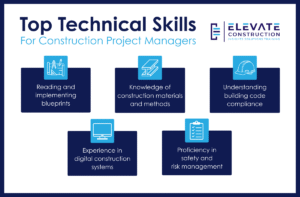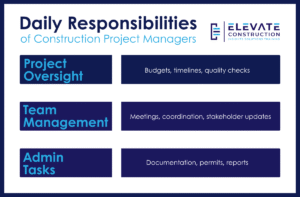At a Glance: On paper, construction management jobs prefer a bachelor’s degree in construction management or related field, plus a few years of industry experience. However, there are various technical skills that can supplement or in some cases substitute the hard experience necessary to succeed in the role.
The construction industry offers solid job opportunities and meaningful work, with the U.S. Bureau of Labor Statistics projecting steady job growth through 2030. Project managers take charge of complex construction projects from initial concept through final inspection.
The role combines technical expertise with stakeholder management; you’ll need to understand building codes and blueprints while also leading teams and communicating with clients. While the work can be demanding, seeing your projects transform from plans to finished buildings makes it a successful career.
This guide will walk you through step-by-step of what it takes to build a meaningful career in construction project management.
Educational Requirements and Qualifications
Academic Background
While not technically necessary, a bachelor’s degree serves as the foundation for most construction management careers. The most direct path is through a construction management degree program, which combines technical expertise with management principles. Civil engineering degrees offer strong technical backgrounds, while architecture programs provide design expertise in the construction industry. Business administration degrees, while less common, can work well when paired with hands-on experience in construction.
Certifications
Professional certifications add value to your qualifications as a construction project manager. The Certified Construction Manager (CCM) credential from the Construction Management Association of America stands out as a respected certification. The Project Management Professional (PMP) certification from the Project Management Institute also carries weight.Occupational Safety and Health Administration (OSHA) safety certifications are mandatory, particularly the 30-hour construction safety course. Some states require specific licenses for construction managers overseeing large projects.
Experience Requirements
Most construction companies look for 3-5 years of field experience before considering someone for a project management role. The typical career path starts with positions like assistant project manager or project coordinator. Entry-level roles often involve construction site supervision, scheduling, or cost estimation. Moving up to project manager usually takes 5-7 years of progressive experience. Senior management positions managing multiple construction projects or overseeing large-scale developments typically require 10+ years in the related field.
Technical Skills and Knowledge

Construction-Specific Abilities
Reading blueprints is a fundamental technical expertise for construction project managers. You’ll need to understand architectural drawings, engineering specifications, and construction documentation. This includes the ability to spot potential design conflicts and verify that plans meet building requirements.
Knowledge of construction process methods and materials shapes your daily decisions as a project manager. You should understand concrete specifications, steel grades, wood framing techniques, and modern construction approaches. This background helps you schedule work properly and validate that contractors use correct materials and installation practices.
Building codes vary by location and project type. As a construction manager, you must stay updated on local, state, and federal regulations covering everything from foundation requirements to fire safety standards. Regular review of code updates keeps your construction projects compliant and prevents costly rework.
Software Proficiency
Modern construction management relies heavily on digital tools. Project management software like Elevate Construction’s Integrated Production Control System helps track project timelines, documents, and team communications. You’ll use these platforms daily to monitor project execution and coordinate work.
Basic computer-aided design (CAD) knowledge helps you review and mark up digital drawings. While you won’t typically create plans, understanding these programs allows you to check measurements and suggest practical design modifications when needed.
Budget software proficiency is mandatory for tracking costs and maintaining financial control. Experience with construction management systems and cost databases helps you monitor expenses, process payment applications, and forecast project spending accurately.
Safety and Compliance
OSHA regulations form the foundation of construction site safety. You must understand fall protection requirements, trenching rules, proper equipment operation standards, and other workplace safety mandates. This knowledge protects workers and prevents violations.
Keeping a construction site safe requires consistent quality control and enforcement of safety protocols. You’ll implement safety training programs, conduct regular inspections, and maintain proper documentation. Understanding how to create site-specific safety plans keeps your projects running safely.
Risk management involves identifying and planning for potential problems. This includes monitoring weather impacts, coordinating equipment and material deliveries, and developing best practices for possible delays. Proper risk assessment prevents accidents and keeps construction projects on schedule.
Daily Responsibilities and Duties

Project Oversight
As a construction project manager, much of your daily oversight comes down to managing details. You’ll track costs closely, review contractor invoices, and adjust spending plans as needed. Along with budgets, you’ll update project timelines, coordinate deliveries, and keep the construction process moving. A portion of your time will also be spent on-site, walking the project to ensure quality standards are met and building codes are followed.
Team Management
A crucial role in day-to-day operations involves stakeholder management and team coordination. Meetings with general contractors are done to review progress and address challenges that arise. You’ll coordinate with project team members to assign tasks and ensure clear understanding of responsibilities, all the while maintaining communication with building owners, architects, and city inspectors to keep them updated on construction project status.
Administrative Tasks
Each day includes updating project documents, filling out progress reports, and keeping detailed records of all construction site activities. You’ll process change orders when plans need updates. You’ll also handle permit applications and ensure proper approvals before initiating new phases of project execution. Safety reports and compliance documents will take up a good chunk of your responsibilities too.
Every task connects to the others; the budget affects scheduling, team performance impacts quality, and good documentation helps everything run smoothly. Your role is to ensure all these components work together to successfully complete the construction project.

Sharpen Your Project Management Skills
Construction project management offers a rewarding career path with strong growth potential. The construction industry continues to expand, with the number of job opportunities expected to grow $5 billion by 2031.
To start your journey, focus on getting a bachelor’s degree in construction management or a related field, gaining hands-on experience through assistant project manager roles, and obtaining relevant certifications. Many employers look for candidates with a few years of construction experience before moving into management positions. Familiarity with modern project management software is also valuable, as it helps teams collaborate efficiently, track timelines, and deliver projects on time.
Ready to take the next step?
Elevate Construction offers training programs and bootcamps designed to sharpen your skills in construction project management.
Book one of our bootcamps today and start your journey toward project success.
–
✅ Reviewed by Jason Schroeder

About the Reviewer: Meet Jason Schroeder, the driving force behind Elevate Construction IST. As the company’s owner and principal consultant, he’s dedicated to taking construction to new heights. With a wealth of industry experience, he’s crafted the Field Engineer Boot Camp and Superintendent Boot Camp – intensive training programs engineered to cultivate top-tier leaders capable of steering their teams towards success.
Jason’s vision? To expand his training initiatives across the nation, empowering construction firms to soar to unprecedented levels of excellence.

